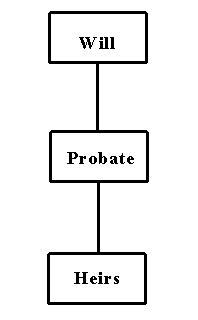At Death
What Happens
To Your Estate?
All wills, whether simple or complex,
handwritten or lawyer drafted,
must pass through the probate process.

A proper estate planning will do the following for you and your family:
- Allow you to choose your heirs and decide when they will receive their inheritance.
- Avoid probate.
- Eliminate or reduce federal estate taxes.
DISTRIBUTION BY WILL
All assets must go through Probate if they Exceed The Statutory Limit
DISADVANTAGES OF PROBATE
 1. Loss of control -- Courts take over
1. Loss of control -- Courts take over
2. Long waiting periods -- Average time 20 months.
3. No privacy -- Probate
4. Psychological effects
5. Expenses
-- Attorney fees
-- Executor fees
-- Appraiser fees
-- Administration fees
-- Court costs
-- Bonds to post
-- Transfer fees
-- Recording fees
As an Alternative, A "Living Trust Package"
The "Living Trust" is a legally drafted document that serves as an alternative to a Will, with many distinct advantages. It may be either "revocable" or "irrevocable". It is viewed, under the scrutiny of the law, to be a legal entity with the same ability to operate any and all ways that a person can. It has three (3) positions to be held; these positions are sanctioned and nominated by the Trustor (yourself):
- A Trustor -- the person(s) setting up the trust which could also be yourself or if you are married, it would be you and your spouse.
- A Trustee -- the person(s) who will manage the trust - which could also be yourself, or if you are married, it would be you and your spouse.
- A Successor Trustee -- is also named to take over the management of your trust at the time of you and your spouse's death, in accordance with the instructions set forth in the Trust.
- A Beneficiary -- the person(s) or organization(s) you want to enjoy the benefits of the assets you have placed in the trust after you have passed away.
You alone may hold all three (3) of the above positions providing that a Successor Trustee is named. The Trustor(s), (yourself, or if you are married, you and your spouse) control the assets of the trust during your lifetime and even after you die !
A "Living Trust Package" and its contents, consisting of a "Living Trust", a "Pour-Over Will", a "Springing Durable Power of Attorney" and a "Durable Power of Attorney for Health Care", are the basic foundations and framework for the proper estate planning. It should be utilized whenever you desire any of the following benefits:
- The "Living Trust" gives you complete control over your assets, allowing you to give whatever you wish, to whomever you wish, at the time YOU designate, and NOT at a time the COURTS appoint.
- The Attorneys and Executors fees, both statutory and extraordinary, are eliminated.
- The Accountants and Appraisers fees, necessary with a will, are eliminated.
- Conservatorship proceedings and expenses are eliminated if you become mentally or physically incapacitated and are incapable of functioning on your own behalf. Your pre-nominated Conservator and/or Attorney-In-Fact, will serve in your behalf.
- Should you die leaving minor children, the requirement that the Court appoint a guardian to care for your children and their inherited property is reduced. The Guardian you have pre-nominated in your Pour-Over Will shall act on your behalf with Court approval.
- The distributions of your trust assets (which is everything that you own) may be done without delay to your heirs, for their immediate benefit, welfare, education and/or support; however, should you wish, you may defer the distribution of the Trust assets to your children until they are of a mature age. Such assets may be invested, with the "income" produced being distributed for your children's education or general welfare until such time as you have deemed that they inherit the principal of such assets.
- A "Living Trust" prevents information contained in its body from falling prey to public scrutiny.
- A "Living Trust" make it difficult for disgruntled heirs to contest the distribution of Trust assets. Simple wills are often contested.
- Additionally, if you own property in another state, Probate is eliminated. A simple will would require that all such out-of-state owned property pass through that state's Probate proceedings.
- A "Living Trust" guarantees the creation of a new cost basis for all Trust property at the time of your death, thus lowering taxes.
- Income from a "family-owned" business shall continue without interruption to your family. Under the guise of a simple will, the income shall be restricted until the Probate proceeding is completed.
- The Successor Trustee of your estate (under the supervision of the laws and the direction of the Trust) may invest, buy and sell assets or securities at any time, while taking advantage of the current market value or current money exchange. Under a simple will, new investments are strictly prohibited while involved in the probate court process. Property exchanges requires court approval.
- A "Living Trust" has no periodic Trust Reports or accounting statements to the Court, with their accompanying public record and legal expenses.
- A "Living Trust" substantially reduces or possibly eliminate Federal Estate Taxes that are levied upon an estate in excess of the Estate Tax Exclusion. With a simple will, your Federal Estate Tax Exclusion may be increased twofold if you are married.
- A "Living Trust" involves no adverse income tax consequences. In fact, you are not required to file a separate tax return for a Revocable Living Trust. All income or losses of your Trust are reported on your individual Federal and State Tax returns. An Irrevocable Trust does, however, require separate Federal and State Tax returns.
- A "Living Trust" is enforced by the United States Constitution, under Article I, Section 10, stating "No State shall pass any law impairing the obligation of contract" (better known as "The Law of Contract Clause") henceforth, a "Living Trust" is a legal document and is used in each and every state of the Union, all of its territories and protectorates.
- Assets can easily be placed in your Trust by simply conveying the title of your stocks, real estate, bank accounts, etc., from "John Doe and/or Mary Doe" to "John Doe and/or Mary Doe, Trustees of the John and Mary Doe Family Trust dated ______." (The date of your trust.) Although the property is titled in the name of the Trust, you retain full right to the use, possession and enjoyment of the property during your lifetime.
- Assets may be removed from your Trust by either selling them or changing title back to your individual names e.g., from "John Doe and/or Mary Doe, Trustees of The John and Mary Doe Family Trust, dated ________" to "John Doe and/or Mary Doe."
- A "Living Trust" is simple and inexpensive to maintain, an attorney is rarely necessary. Additionally, it involves a minimum amount of paperwork.
- A "Pour-Over Will", which is a special type of will used with a "Living Trust", is an integral part of the "Living Trust Package", taking precedence over all previous wills. It transfers into the "Living Trust" any assets accidentally left out of the Trust during your lifetime.
- A "Springing Durable Power of Attorney" (asset management powers) is another legal document which allows you to name a person(s) sanctioned to manage your affairs for you, only in the event you become physically or mentally incapacitated. In its body, you not only name your attorney-in-fact, but you also nominate your conservator, which precludes the hassle of any court action in determining a Conservatorship.
- For Health Care Durable Power of Attorney, which contains the Right To Die Statement is recognized in most states and is also approved by the American Medical Association. It allows you to determine whether you desire the application of life sustaining procedure, to prolong the moment of your death should you be found to have an incurable injury, disease or illness certified to be a terminal condition by at least two physicians. It provides an agent (attorney in fact) to authorize your health care needs if you are unable to do so.
 1. Loss of control -- Courts take over
1. Loss of control -- Courts take over